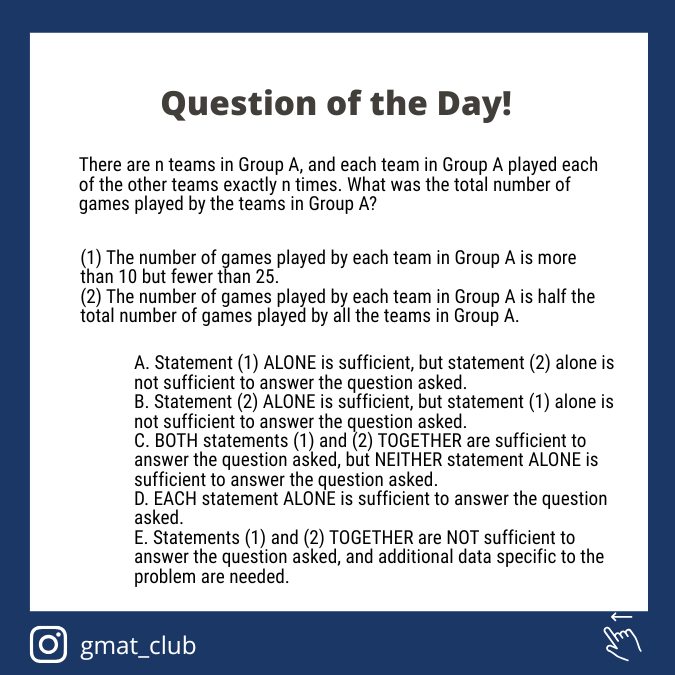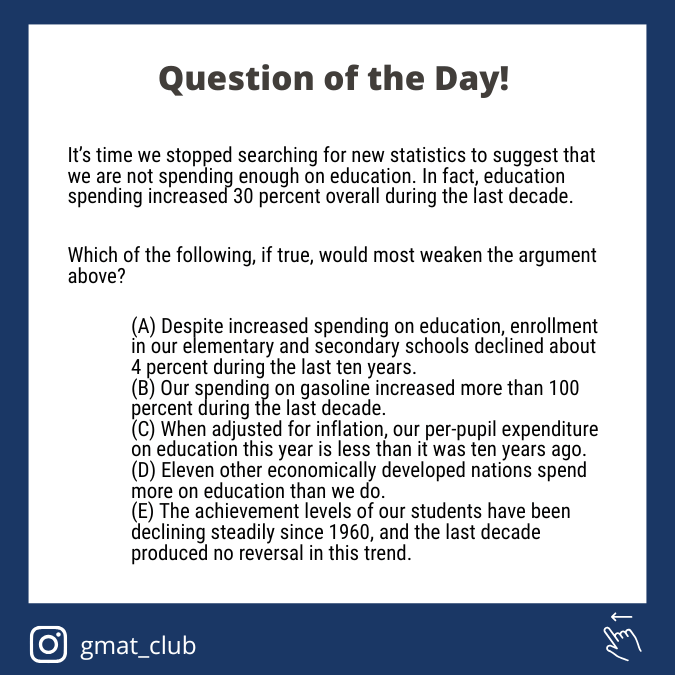Events & Promotions
|
|

GMAT Club Daily Prep
Thank you for using the timer - this advanced tool can estimate your performance and suggest more practice questions. We have subscribed you to Daily Prep Questions via email.
Customized
for You
Track
Your Progress
Practice
Pays
Not interested in getting valuable practice questions and articles delivered to your email? No problem, unsubscribe here.
- Nov 19
12:30 PM EST
-01:30 PM EST
Learn how Keshav, a Chartered Accountant, scored an impressive 705 on GMAT in just 30 days with GMATWhiz's expert guidance. In this video, he shares preparation tips and strategies that worked for him, including the mock, time management, and more - Nov 18
11:00 AM PST
-12:00 PM PST
Join us in a live GMAT practice session and solve 30 challenging GMAT questions with other test takers in timed conditions, covering GMAT Quant, Data Sufficiency, Data Insights, Reading Comprehension, and Critical Reasoning questions. - Nov 20
01:30 PM EST
-02:30 PM IST
Learn how Kamakshi achieved a GMAT 675 with an impressive 96th %ile in Data Insights. Discover the unique methods and exam strategies that helped her excel in DI along with other sections for a balanced and high score. - Nov 22
11:00 AM IST
-01:00 PM IST
Do RC/MSR passages scare you? e-GMAT is conducting a masterclass to help you learn – Learn effective reading strategies Tackle difficult RC & MSR with confidence Excel in timed test environment - Nov 23
11:00 AM IST
-01:00 PM IST
Attend this free GMAT Algebra Webinar and learn how to master the most challenging Inequalities and Absolute Value problems with ease. - Nov 24
07:00 PM PST
-08:00 PM PST
Full-length FE mock with insightful analytics, weakness diagnosis, and video explanations! - Nov 25
10:00 AM EST
-11:00 AM EST
Prefer video-based learning? The Target Test Prep OnDemand course is a one-of-a-kind video masterclass featuring 400 hours of lecture-style teaching by Scott Woodbury-Stewart, founder of Target Test Prep and one of the most accomplished GMAT instructors.
Kudos
Bookmarks
WA@vcx3674
These are the most fun, so get a few of them and play a game with yourself as a puzzle. Make sure you start with easy ones and if you can get 10/10 correct, move on to the medium ones, and then if you get 10/10 correct, move on to the hard ones. And I would not worry too much about timing at first. Keep note of it and TRY to fit into 20 mins with 10 questions but don’t cut it off. You can do this over 2-3 days by the way. 10 questions per day type of thing so you don’t go too crazy. Make notes for ANY question you miss and write why you missed it. If you can’t figure out why you missed, you have bigger problems to work on
Kudos
Bookmarks
This post came through our private GMAT Club WhatsApp Group.
Join the WhatsApp Community or Log in to view the full message.
Join the WhatsApp Community or Log in to view the full message.
Kudos
Bookmarks
This post came through our private GMAT Club WhatsApp Group.
Join the WhatsApp Community or Log in to view the full message.
Join the WhatsApp Community or Log in to view the full message.






















